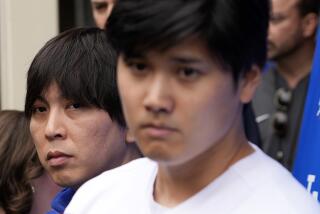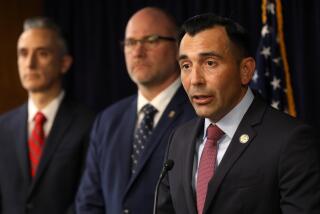Daiwa Indicted, Ordered to Shut U.S. Operations : Law: Federal officials accuse Japanese bank of directing a plot to hide $1.1-billion trading loss from examiners.
- Share via
NEW YORK — In an unusually harsh action, federal authorities indicted Daiwa Bank Ltd. on Thursday and ordered it to close its U.S. operations, accusing the major Japanese bank of carrying out an elaborate criminal plot to try to hide a $1.1-billion trading loss from federal bank examiners.
Under Thursday’s order, the scandal-ridden bank must close all of its U.S. offices by Feb. 2. It has at least 17 offices in 11 states, including two offices in Los Angeles and one in San Francisco.
The steps are the toughest the U.S. government has taken against a foreign financial institution since it shut down the Bank of Credit & Commerce International four years ago in what was called the biggest bank fraud in history.
The 24-count indictment returned Thursday by a federal grand jury in Manhattan accused the bank of fraud, conspiracy, falsifying bank records and failing to notify U.S. authorities that felonies had been committed. If convicted on all counts, Daiwa faces a maximum penalty of more than $1 billion in fines.
In a statement, Daiwa called the indictment “regrettable and unfortunate” and said it would fight the criminal charges.
In Tokyo, Finance Minister Masayoshi Takemura said it was “truly regrettable” that Daiwa had “engaged in inappropriate management practices.”
The Finance Ministry also announced today its own sanctions against Daiwa, ordering streamlining of its overseas operations, including cuts in its international lending and security holdings.
The Daiwa debacle places further pressure on Japan’s entire banking system, which is burdened by at least $500 billion in bad loans, according to a Finance Ministry estimate. Daiwa’s problems may also accelerate what many analysts say is a badly needed restructuring of Japan’s banking system, with some of the weakest banks allowed to go bankrupt and others merging.
Sumitomo Bank Ltd., one of Japan’s strongest banks, announced today that it would help Daiwa as it winds down its U.S. operations. Yoshifumi Nishikawa, a Sumitomo managing director, said Sumitomo may purchase Daiwa assets, provide assistance in foreign markets and hire some of Daiwa’s U.S. employees.
“There is a possibility that a merger with Daiwa will be one of the options,” Nishikawa said.
Finance Ministry spokesman Yukio Yoshimura said the Daiwa incident would also prompt the ministry to “strengthen our inspection in the overseas branches and offices of Japanese banks.” A special team of investigators will be formed just for banks’ overseas operations, he said.
In agreeing to close its U.S. operations, Daiwa said it wasn’t admitting wrongdoing and denied that the bank’s senior management had ordered any cover-up. Takashi Kaiho, Daiwa’s new president, asserted that none of the banks’ customers were harmed and said the bank was the only victim.
In a related development, Daiwa said Thursday it would cut its staff by 27%, dropping 2,600 of its 9,600 employees, from its Japan and foreign operations. Daiwa’s operation in the United States had a low profile because it did not operate retail branches, but catered largely to financiers and corporate customers.
The bank has been under investigation since it disclosed in September that the former head government bond trader in its New York branch, Toshihide Iguchi, had secretly amassed the losses over 11 years from unauthorized trading in U.S. Treasury securities.
Iguchi initially hid the losses from his superiors before disclosing them in a letter to the bank’s Osaka headquarters in July.
But U.S. officials chose to take harsh action as evidence piled up that the bank’s senior officials in Japan ordered the branch to cover up the losses for nearly two months. The indictment alleges that the officials feared severe repercussions from U.S. authorities if they learned of the loss. Daiwa finally notified U.S. officials Sept. 18.
According to published reports, Daiwa, the 10th largest of Japan’s 11 money-center banks, notified Japanese regulators of the loss on Aug. 8. But the regulators reportedly allowed the bank to conceal the loss from U.S. authorities.
The order to close Daiwa’s U.S. operations had been sought by the Federal Reserve Board and state banking authorities in six states, including New York and California. They charged that Daiwa “engaged in a pattern of unsafe and unsound banking practices and violations of law over an extended period of time that are most serious in nature.”
At a press conference, Mary Jo White, the U.S. attorney in Manhattan, said she had decided to seek an indictment of the bank because “a number of its highest senior officials themselves committed crimes as they attempted to cover up other crimes.”
The indictment charges only the bank itself. Iguchi, the New York-based trader who racked up the losses, pleaded guilty Oct. 19 to federal fraud and embezzlement charges and agreed to cooperate with the U.S. investigation.
On Thursday, federal prosecutors also filed a separate criminal complaint against Masahiro Tsuda, a former general manager of Daiwa’s New York branch, accusing him of conspiracy to deceive the Federal Reserve Board.
White declined to say if prosecutors were considering seeking criminal charges against more senior Daiwa officials. She said only that “the investigation is continuing.”
In the wake of disclosures about the $1.1-billion loss, Daiwa’s president, Akira Fujita, and chairman, Sumio Abekawa, resigned on Oct. 9.
Kaiho, the new president, said Thursday that the bank’s actions had been justified “by our desire to investigate thoroughly the unauthorized activities by which it was victimized” and to take action in a way that wouldn’t unsettle the international banking system. The bank had secretly transferred money from Japan to cover the losses before they were disclosed.
“Blaming Daiwa Bank in the criminal courts for thievery and other unauthorized activities makes no sense,” Kaiho said. “It is clear that the bank remains the sole victim of Mr. Iguchi’s wrongdoing.”
The federal indictment charges that Iguchi, in his disclosure letter to senior Daiwa officials in Osaka, outlined ways that records could be falsified and the losses hidden from U.S. authorities.
He advised them to take such steps because he said “if this matter is known to the U.S. authorities . . . it is clear that from a legal standpoint this will make the continuation of the U.S. operation difficult,” the letter said.
Beginning July 28, in a series of meetings with Iguchi at New York’s Park Lane Hotel, senior Daiwa officials from Japan, including the bank’s deputy president, agreed on ways to hide the losses from U.S. officials, according to the indictment.
In addition to the alleged cover-up, the indictment also charged that the New York branch had deliberately deceived American banking authorities about its operations for years.
For example, Daiwa allegedly maintained a secret, unauthorized room for trading Treasury securities. When bank examiners came to visit from 1988 through 1993, Daiwa allegedly shuttled traders to another office and disguised the room as a storage room, the indictment said.
At Daiwa’s branch on 5th Avenue in Manhattan, doors were locked to outsiders on Thursday afternoon and plainclothes security officers were posted to turn away reporters.
The U.S. action against Daiwa came on the same day that Japanese authorities announced mild, but unprecedented, sanctions against the Tokyo office of a major U.S. brokerage firm. The Japanese Finance Ministry ordered one division of the Tokyo office of Merrill Lynch, the largest U.S. brokerage firm, to stop trading stocks for the firm’s own account for two days.
The sanctions followed disclosures that the office for six years had violated a Japanese securities trading regulation. Merrill said it stopped the improper trading and notified Japanese authorities in February that possible violations had occurred.
Times staff writers Thomas S. Mulligan in Los Angeles and Helaine Olen in New York also contributed to this story. Paltrow reported from New York and Holley from Tokyo.
More to Read
Inside the business of entertainment
The Wide Shot brings you news, analysis and insights on everything from streaming wars to production — and what it all means for the future.
You may occasionally receive promotional content from the Los Angeles Times.










